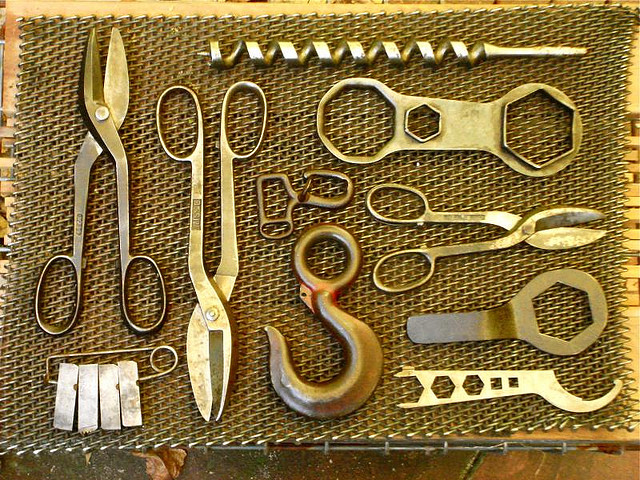Not All Contracts Are Created Equally
A contract is a contract is a contract.
Right?
Sort of.
While all contracts are tools, not all contracts do the same thing.
There are different types of contracts for different purposes and if you’re going to manage your own freelance business, you need to be able to know which contract to use when.
“But Katie,” you say, “won’t my client know which contract to use?”
My dear freelancer, never, ever, ever put your legal well-being in the hands of your clients.
They may be very nice people, but their interests aren’t your interests. If you blindly trust they know what’s what, you may be agreeing to something that isn’t in your best interest.
And, let’s face it, figuring out contracts can be confusing. I’ve seen some very sophisticated businesses send out contracts that are absolutely lousy for the things they need the contract to do. While you can, with enough force, jam a square peg into a round hole, there are probably better uses of your time and energy.
Nondisclosure Agreements
Nondisclosure agreements are about secrets. Specifically they are about what you will and won’t do when you learn about someone else’s secrets.
Nondisclosure agreements (or NDAs )often come up early in a relationship with a client, likely before they’ve officially hired you. They may want to share important information with you to determine if you’re the right fit for the job. But they don’t want you wandering away blabbing what you learned if you all decide not to work with one another.
An NDA will identify what information needs to be kept secret, what you can and cannot use the secret information for, how long you have to keep it secret and what happens if you don’t keep it secret.
Things to look out for: Many template NDAs do a really crappy job of telling you what information needs to be kept secret. In an effort to save everyone from the effort of being thoughtful, the agreement might define confidential information as “any and all information which, in the normal course of business, is considered confidential.”
While that definition excels at having a lot of words and “sounding smart,” it doesn’t actually define much of anything. And if you’re going to be legally bound to protect information, you need to know what it is.
Common fixes include describing the type of information at issue (“information regarding financial status and marketing plans”) or saying that your promise of confidentiality applies to everything that is marked as confidential.
Good to know: NDAs can and often do, last longer than the job or interaction with the client. So be mindful of what you share and with whom after the fact. Also, this should go without saying but Twitter, Facebook and Tumblr are not places to share information protected under an NDA. Even if you’re super excited to be working on “Super Secret Project with Super Secret Client.” Just say “no” to social media’ing yourself into legal trouble.
Independent Contractor/Services Agreement
These are the contracts that you will likely see the most as a freelancer. They describe the work you are being hired to do, how you’ll get paid and what promises you and your client are making to one another. They are contracts about doing work.
Everyone has pet names for their contracts, but you’ll most likely see contracts that describe freelance work as “Independent Contractor Agreements,” “Services Agreement” (or Master Services Agreement) or, simply, “Freelance Agreement.”
Things to look out for: These types of agreements should never identify you as an employee, if they do, the contract is confused and should be fixed pronto.
These contracts will often ask you to carry insurance. Make sure all of the types of insurance it requires of you apply to your working situation. You don’t want to agree to take out a policy for helicopter insurance if you won’t, in fact, be using helicopters to do the job. (You think I jest; ha!)
Make sure (1) the work is described well enough that a stranger would be able to figure out what you’re being hired to do, (2) you know exactly what needs to happen for you to be able to get paid and (3) every promise that is important about the job is in the contract.
Good to know: Agreements like these usually supersede earlier agreements or promises. So if your client has been promising you something about the job in a string of emails, but that information isn’t in the contract, or worse is contradicted by what’s in the contract, do not sign the contract until things are straightened out. Think of the contract as the One Ring: it rules all.
Temporary Employee Agreements
Some places will want to hire you as temporary employee because it’s easier for them administratively. That’s fine, but you have to make sure that what the agreement says doesn’t negatively impact your ability to do other work. You don’t want to take on a 5 hours-a-week gig and unknowingly make a promise that you won’t do “similar work” for anyone else during the term of your employment.
Things to look out for: Read the intellectual property section very carefully. Many of the work-for-hire sections are broad and can capture work that you do outside of your work for the client. The IP they get should be for work directly related to what they are hiring you to do, not anything and everything you create “during the term of this agreement.” Why? The “term of the agreement” is a measure of time, not a way of saying “stuff done under this agreement.” If the agreement lasts six months, you don’t want everything you create during that six month period to belong to your temporary employer.
Good to know: Many employment agreements will require you to consent to drug testing. If you aren’t going to be working at their facilities or using their equipment, I personally find those types of provisions over reaching. It’s not a legal issue, but a something to pay attention to all the same.
BONUS: But Katie, what about Work For Hire Agreements???
Many different types of agreements can contain work-for-hire clauses in them. That’s why it’s so important to read your contracts (or hire someone to read them for you if you can’t stomach it)!
Work-for-hire comes up in two main ways: (1) you’re someone’s employee (temporary or permanent) and what you create for them is considered a work-for-hire, or (2) someone specially commissions you to make something for them and the thing you’re going to make fits one of the work-for-hire categories.
Not so shocking legal factoid: lawyers will put work-for-hire clauses into contracts even when work-for-hire does not apply to the situation. Why? Because it’s easy. The clause will usually have a safety latch that says “If this thing can’t be a work-for-hire then it’s a copyright assignment so we still own it, OK? Cool.”
If you want to hold on to the IP until the client pays their final bill, you don’t want a work-for-hire clause in your contract. If you have a valid work-for-hire clause, you don’t own the IP and can’t withhold it if the client doesn’t pay.
Categories: Making Sense of Contracts






